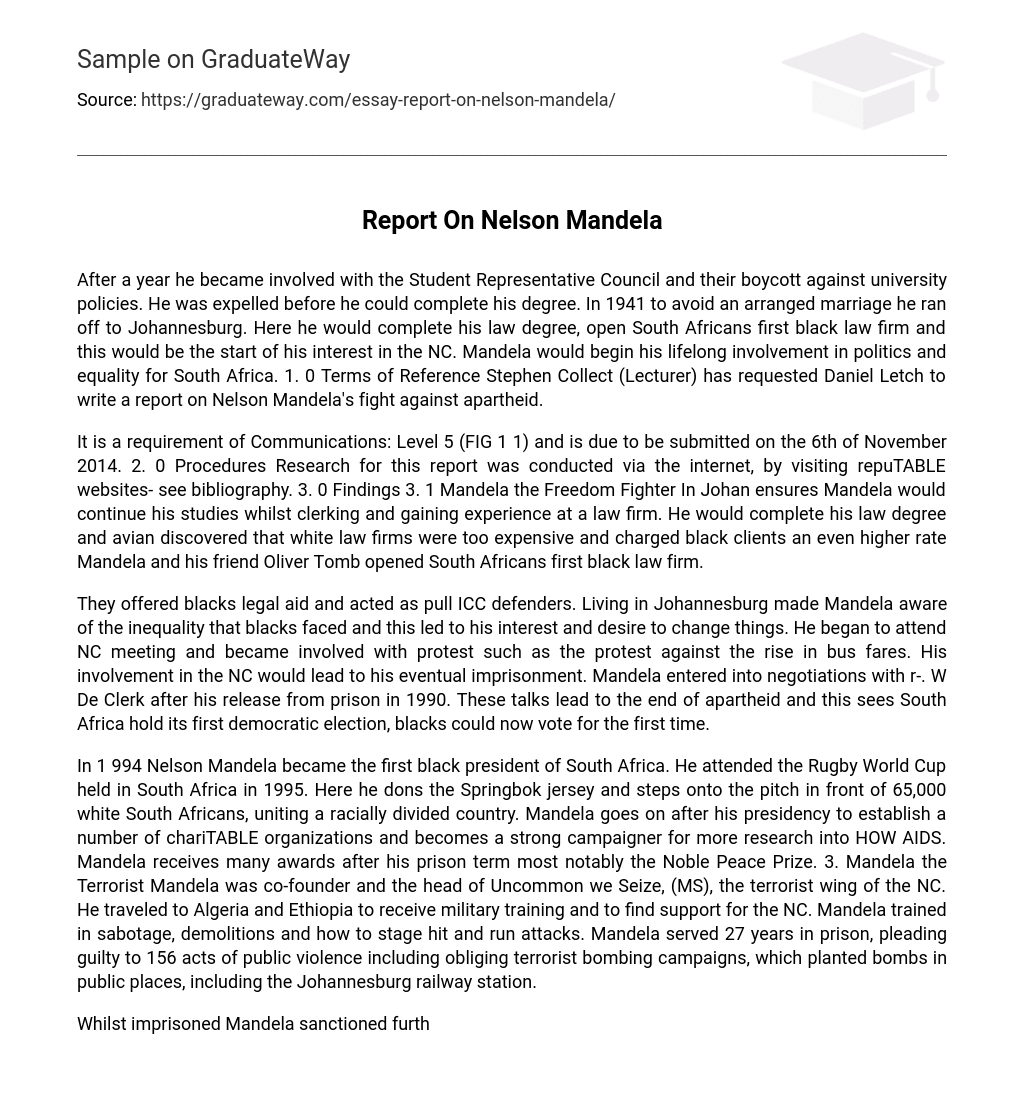After a year he became involved with the Student Representative Council and their boycott against university policies. He was expelled before he could complete his degree. In 1941 to avoid an arranged marriage he ran off to Johannesburg. Here he would complete his law degree, open South Africans first black law firm and this would be the start of his interest in the NC. Mandela would begin his lifelong involvement in politics and equality for South Africa. 1. 0 Terms of Reference Stephen Collect (Lecturer) has requested Daniel Letch to write a report on Nelson Mandela’s fight against apartheid.
It is a requirement of Communications: Level 5 (FIG 1 1) and is due to be submitted on the 6th of November 2014. 2. 0 Procedures Research for this report was conducted via the internet, by visiting repuTABLE websites- see bibliography. 3. 0 Findings 3. 1 Mandela the Freedom Fighter In Johan ensures Mandela would continue his studies whilst clerking and gaining experience at a law firm. He would complete his law degree and avian discovered that white law firms were too expensive and charged black clients an even higher rate Mandela and his friend Oliver Tomb opened South Africans first black law firm.
They offered blacks legal aid and acted as pull ICC defenders. Living in Johannesburg made Mandela aware of the inequality that blacks faced and this led to his interest and desire to change things. He began to attend NC meeting and became involved with protest such as the protest against the rise in bus fares. His involvement in the NC would lead to his eventual imprisonment. Mandela entered into negotiations with r-. W De Clerk after his release from prison in 1990. These talks lead to the end of apartheid and this sees South Africa hold its first democratic election, blacks could now vote for the first time.
In 1 994 Nelson Mandela became the first black president of South Africa. He attended the Rugby World Cup held in South Africa in 1995. Here he dons the Springbok jersey and steps onto the pitch in front of 65,000 white South Africans, uniting a racially divided country. Mandela goes on after his presidency to establish a number of chariTABLE organizations and becomes a strong campaigner for more research into HOW AIDS. Mandela receives many awards after his prison term most notably the Noble Peace Prize. 3. Mandela the Terrorist Mandela was co-founder and the head of Uncommon we Seize, (MS), the terrorist wing of the NC. He traveled to Algeria and Ethiopia to receive military training and to find support for the NC. Mandela trained in sabotage, demolitions and how to stage hit and run attacks. Mandela served 27 years in prison, pleading guilty to 156 acts of public violence including obliging terrorist bombing campaigns, which planted bombs in public places, including the Johannesburg railway station.
Whilst imprisoned Mandela sanctioned further acts of terrorism notably the Church Street car bombing on May 20th 1 983, killing 19 people and injuring more than 200. Amnesty International refused to recognize Mandela as a “prisoner of conscience” and never asked for his release. Mandela refused South African President PI Booth’s offer to release him if he renounced violence, and violent protest, as a means to bring about change in South Africa. Previous offers of release had been rejected by Mandela where the condition was that he be confined to the Transfer.
As well as his links to communism he was a supporter and the NC a beneficiary of Colonel Gadding. Other allies included Fidel Castro and Robert Engage. Mandela was on Americas terrorist watch list from 1 988 until 2008, 14 years after Mandela had been elected president and nine years after he had left power. 4. 0 Conclusion Many innocent South Africans of all races died as a result of apartheid and as a result of those standing against apartheid.
Nelson Mandela was accounTABLE for some of the lives lost both directly and indirectly as he had sanctioned many of the terrorist attacks while in prison. Mandela was both leader of the NC and a follower of communist policies. He had many allies a few of which were dictators. He did bring an end to apartheid but the cost along the way cost many South Africans their lives. Mandela’s terms as president made little change other than to give blacks the right to Vote. South Africa today suffers from more recorded crime and violence than ever. Mandela was both a freedom fighter and a terrorist.





